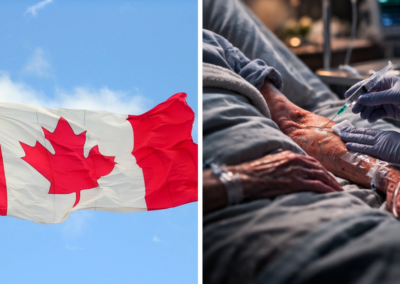A Canadian woman who has a disability, who had her request for assisted suicide approved after she was unable to afford appropriate housing, has put her request for assisted suicide on hold after receiving thousands of dollars in donations for better housing.
The 31-year-old woman, known as Denise, suffers from Multiple Chemical Sensitivities (MCS), which trigger rashes, difficulty breathing, and blinding headaches. She had previously applied and received approval for assisted suicide “essentially, because of abject poverty” as she put it.
Denise had been unable to afford housing which she needed to alleviate her condition and had applied to end her own life.
However, in response to the original story, a GoFundMe campaign was set up by members of the public, which has garnered more than $65,000 in donations from almost a thousand strangers. Denise has now been able to find temporary accommodation that does not exacerbate her symptoms.
“It’s … mind-blowing and inspiring”, said Denise, in a phone interview with CTV news.
“These are strangers saying they do not want this to happen. I am even struggling to find the words”.
“I am no longer focusing on just survival. Mentally, I am more clear to put things in place to put a more liveable life”.
She is currently searching for long-term subsidised housing that will be able to meet her needs and while she has paused her application for assisted suicide, she has not cancelled it outright.
Serious questions are being raised about the euthanasia law in Canada
One of Denise’s physicians, Dr Riina Bray, the medical director of the Environmental Health Clinic at Women’s College Hospital in Toronto, said that the “irremediable suffering” that qualified her for a medically assisted death was fixable.
She said this case indicates that “these patients can easily return to wellness if they are given the right environment to live. It’s a simple equation”.
Denise and her supporters are now raising serious questions about how the assisted suicide and euthanasia laws are applied.
Denise said the doctors who offered assisted suicide discussed her suffering, not solutions: “During the assessment, very little was focused on what services I had, what I needed to achieve some level of normal. Nothing was offered in terms of support”.
“We’re calling for an investigation …. into physicians who are improperly applying the (MAID) legislation”, said David Fancy, a professor at Brock University and one of Denise’s supporters.
Expanding euthanasia law
Euthanasia has been legal in Canada since 2016. In 2019, however, following the euthanising of Alan Nichols, a former school caretaker who was physically healthy but struggled with depression, the legal requirement that a person be terminally ill before administration of euthanasia was dropped.
The Second Annual Report on Medical Assistance in Dying in Canada 2020 states that euthanasia and assisted suicide deaths account for 2.5% of all deaths in Canada.
Bill C-7, which the Canadian Parliament passed in March 2021, further extended euthanasia legislation to people with disabilities and those with mental health issues, over the age of eighteen.
In 2018, Roger Foley, a man with a chronic neurological disease, recorded hospital staff offering him an assisted suicide despite him being clear that he wanted assistance to live at home and not to end his life.
In 2020, an elderly woman in Canada was euthanised to avoid having to live through another COVID-19 lockdown.
Euthanasia in Canada will be made legal on the grounds of mental illness alone in March 2023.
Right To Life UK spokesperson Catherine Robinson said: “This story illustrates one of the many difficulties with euthanasia and assisted suicide legislation. It is predicated on the idea that there is suffering that cannot be overcome, that cannot be alleviated, that there is no hope. But that is simply not true”.
“People like Denise, or those suffering in other ways should not be told they have no hope. They should be offered the mental, physical, spiritual, emotional and financial help they need to live and thrive. Whatever issues they’re having, death is not the answer”.












